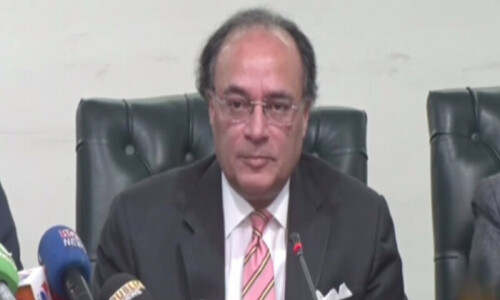KARACHI: The country’s current account recorded a deficit of $7 billion in the first five months (July to November) of the current fiscal year, mainly on account of increasing imports, the State Bank of Pakistan (SBP) data showed on Monday.
At $1.91bn, November saw the highest monthly current account deficit since July 2018 when it reached $2.1bn. This was the year when the country faced a record $20bn current account deficit.
Besides, the five-month figure of $7bn this year stands in total contrast to a current account surplus of $1.64bn during the same period a year ago.
The current account deficit widened from $1.76bn in October to $1.91bn in November “as imports outstripped strong exports [and] robust remittances”, the SBP tweeted. “Imports were mainly lifted by high international commodity prices in addition to strong domestic economic recovery.”
November sees highest monthly CA deficit in over three years
In its Dec 14 monetary policy, the SBP said the current account deficit for the ongoing fiscal year would come in at 4pc of GDP — higher than earlier forecast of 2-3pc of GDP.
However, the five-month deficit has already reached 5.3pc, leaving no chance of a decline amid a rising import bill.
It was also noted that the import bill for November shown by the State Bank was $6.423bn — significantly lower than the figures provided by the Pakistan Bureau of Statics (PBS), whose data shows the imports of goods was $7.928bn during the month.
As compared to the central bank’s data, the import bill reflected by the PBS was higher by $202m in July, $579m in August, $542m in September, $358m in October, and $1.5 billion in November.
Some analysts were particularly sceptical about the stark difference in the November figures. However, some believed the difference would be adjusted the next month since the State Bank compiles data after the payment through banks while PBS’s figures are based on information provided by Pakistan Customs, which means it relies on the physical movement of goods.
As per the PBS data, the imports of goods in November jumped 84pc to $7.927bn compared to the same month a year ago. Similarly, the July-November import bill went up by 70pc to $33bn from $19.5bn in the same period last year.
The current account deficit is on the rise, as the government struggles to curtail the import bill while the exports posted modest year-on-year growth of 27pc during the five months to November.
According to the SBP data, the deficit was $773m in July, $1.473bn in August, $1.113bn in September, $1.76bn in October, and $1.908bn in November.
Analysts believe the current account deficit may hit $15bn by the end of this fiscal year.
The government is striving to maintain the foreign exchange reserves at an adequate level to mitigate the impact of a ballooning current account deficit. Despite borrowed foreign exchange, the reserves have been declining during the current fiscal year, adversely affecting the exchange rate and resulting in the rupee’s depreciation.
Foreign exchange reserves held by the central bank fell by 7pc in November, indicating lower inflows. Meanwhile, the country neither received the expected $1bn loan from the International Monetary Fund nor could it launch Sukuk bonds which it planned to raise $1-1.5bn from the international market.
Published in Dawn, December 21st, 2021














































